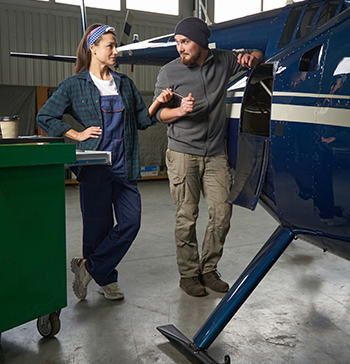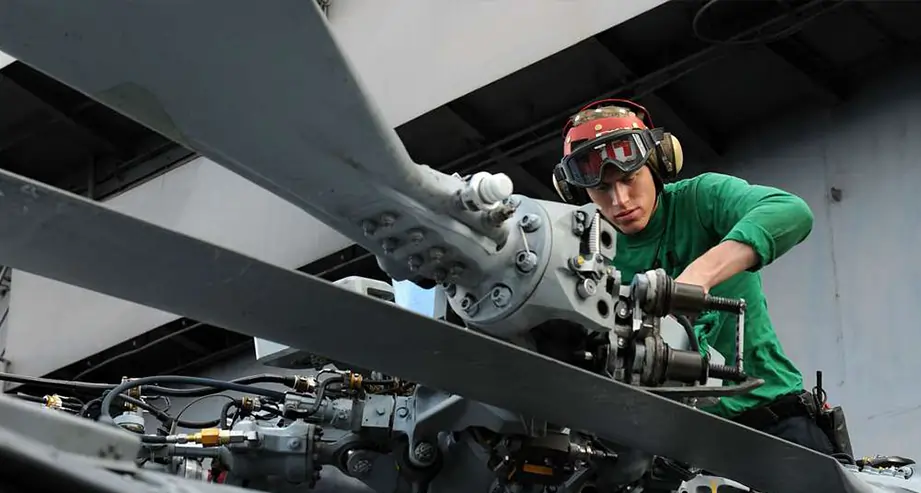Are you contemplating a career change? Have you ever been captivated by the intricate workings of machines and the thrill of flying? If so, a career in aviation mechanics may be your ideal pathway. At Aero Wave Aviation and Maintenance School in the Philippines, we believe that the aviation sector offers remarkable opportunities for growth, stability, and personal fulfilment.
Aviation mechanics play a pivotal role in ensuring the safety and functionality of aircraft, which is critical in an industry where passenger safety is paramount. Whether it’s performing routine maintenance, troubleshooting complex issues, or conducting inspections, aviation mechanics are vital to the aviation ecosystem. As air travel continues to increase globally, the demand for skilled aviation mechanics is skyrocketing, making this a timely and lucrative career choice.
In this comprehensive overview, we will delve into the field of aviation mechanics, explore the qualifications required, outline the training provided at Aero Wave, discuss the job prospects and earning potential, and highlight the satisfaction that comes from a career dedicated to ensuring the safety and functionality of aircraft.
The Aviation Industry Landscape
The aviation industry is a dynamic and rapidly evolving sector that plays a crucial role in the global economy. The International Air Transport Association (IATA) predicts that global air passenger numbers will reach 8.2 billion by 2037. This growth translates into a significant increase in the need for qualified aviation professionals, particularly mechanics who can ensure that the aircraft are safe and operational.
In the Philippines, the aviation sector is burgeoning, fueled by both local and international travel demand. The government has invested in infrastructure improvements, expanding airports and increasing flight routes, which has led to a growing fleet of aircraft. As airlines expand their fleets to accommodate this demand, the need for skilled aviation mechanics becomes even more pronounced.
The aviation industry encompasses various segments, including commercial airlines, cargo transport, military aviation, and private aviation. Each of these sectors requires trained mechanics who understand the complexities of aircraft systems and can perform maintenance, repairs, and inspections to adhere to strict safety regulations.
Furthermore, the industry is undergoing technological advancements with the rise of new aircraft models that utilise advanced materials, more efficient engines, and state-of-the-art avionics systems. Mechanics must stay abreast of these changes to remain effective in their roles. Thus, pursuing a career in aviation mechanics not only promises job security but also offers the chance to work with cutting-edge technology.
Why Choose a Career in Aviation Mechanics?
Choosing a career in aviation mechanics can be a life-changing decision. Here are some compelling reasons to consider this path:
- Job Security: The aviation sector is resilient, and the demand for skilled aviation mechanics continues to grow. As airlines expand their fleets and new aircraft technologies emerge, the need for qualified professionals remains steady. The Bureau of Labor Statistics projects that employment for aircraft and avionics mechanics will grow by 11% from 2020 to 2030, faster than the average for all occupations. This trend indicates a robust job market and excellent career prospects.
- Diverse Opportunities: The aviation industry is vast, and as an aviation mechanic, you have the freedom to specialise in various areas. You could choose to work with commercial airliners, military aircraft, or private jets. Additionally, within the mechanic role, you can focus on airframe maintenance, powerplant mechanics, or avionics, allowing you to tailor your career according to your interests and skills.
- Competitive Salary: Aviation mechanics are well-compensated for their skills and expertise. The financial rewards, combined with opportunities for advancement, make it a lucrative career choice. In the Philippines, entry-level mechanics can earn around ₱20,000 to ₱30,000 monthly, while experienced professionals can command salaries exceeding ₱60,000 to ₱80,000. Additionally, those who specialise or take on managerial roles can earn even higher.
- Passion for Aviation: If you have a love for aviation and engineering, working as an aviation mechanic allows you to turn that passion into a fulfilling career. You’ll be part of a team that plays a vital role in the safety of passengers and cargo. The thrill of being involved in the aviation process—from pre-flight checks to maintenance operations—can be incredibly rewarding.
- Continuous Learning: The aviation industry is always evolving, with new technologies and practices emerging. As an aviation mechanic, you will have the chance to continually enhance your skills and knowledge through ongoing training and education. This commitment to learning ensures that your career remains dynamic and engaging.
- Contribution to Safety: Finally, working as an aviation mechanic means playing a critical role in the safety and reliability of air travel. The satisfaction of knowing you contribute to the safety of countless passengers is a rewarding aspect of this career. Each aircraft you maintain or repair is a testament to your skills and dedication.
Want to find out more about our Aviation Mechanic Courses?
Training at Aero Wave Aviation and Maintenance School
At Aero Wave Aviation and Maintenance School, we provide a comprehensive aeronautical mechanic courses designed to equip you with the necessary skills and knowledge to excel in the aviation mechanics field. Our curriculum is structured to ensure that students receive a well-rounded education that includes both theoretical and practical components.
Accredited Programs
Our programs are accredited by the Civil Aviation Authority of the Philippines (CAAP), ensuring that the training you receive meets the highest industry standards. This accreditation not only validates the quality of our programs but also opens doors for graduates to pursue careers both locally and internationally. It ensures that our students are recognized by employers, enhancing their employability upon graduation.
Hands-On Training
At Aero Wave, we believe that the best way to learn is through hands-on experience. Our facilities are equipped with modern aircraft, simulators, and tools that students will use throughout their training. This practical approach allows students to gain real-world experience and confidence in their abilities. From conducting pre-flight checks to performing complex repairs, students learn to handle various tasks that mechanics encounter daily.
Experienced Instructors
Our instructors are seasoned professionals with extensive experience in the aviation industry. They bring a wealth of knowledge and insight to the classroom, providing students with a unique perspective on the challenges and rewards of working as an aviation mechanic. Our instructors are dedicated to mentoring students, sharing their industry experiences, and fostering a passion for aviation in the next generation of mechanics.
Comprehensive Curriculum
The curriculum at Aero Wave covers essential topics such as:
- Aircraft Systems: Understanding the various systems that make up an aircraft, including electrical, hydraulic, and pneumatic systems. Students will learn how these systems function and how to troubleshoot issues that may arise.
- Maintenance Practices: Learning about routine inspections, preventive maintenance, and troubleshooting techniques. Students will gain insights into industry best practices and the importance of maintaining meticulous records.
- Safety Protocols: Emphasising the importance of safety and compliance with regulations set forth by aviation authorities. Our training includes hands-on exercises that instil a culture of safety among students.
- Specialised Training: Opportunities to specialise in areas such as avionics, power plants, and airframe maintenance. This specialisation allows students to focus their training on their areas of interest, preparing them for specific roles in the industry.
Job Prospects and Earning Potential
The job outlook for aviation mechanics is promising, especially in the context of a growing global demand for air travel. According to the Bureau of Labor Statistics, employment for aircraft and avionics mechanics is projected to grow by 11% from 2020 to 2030, faster than the average for all occupations. This growth is fueled by an increase in air travel and the need for routine maintenance on ageing aircraft.
In the Philippines, the aviation industry is expanding rapidly. With the influx of new airlines, increased domestic and international travel, and significant investments in airport infrastructure, the demand for aviation mechanics is on the rise. Graduates of Aero Wave can expect a wealth of job opportunities across various sectors, including commercial airlines, cargo transport, military aviation, and private aviation.
Aviation mechanics can expect competitive salaries, which can vary based on experience, location, and the type of employer. Entry-level positions may start at around ₱20,000 to ₱30,000 per month, while experienced mechanics can earn upwards of ₱60,000 to ₱80,000 per month, especially in specialised roles or leadership positions. Additionally, many employers offer benefits such as health insurance, retirement plans, and opportunities for overtime, further enhancing the overall compensation package.
Career Pathways in Aviation Mechanics
Aviation mechanics have various career pathways available to them, including:
- Airframe and Powerplant Mechanics: These specialists focus on the maintenance of an aircraft’s structure and engines. They conduct inspections, repairs, and modifications to ensure aircraft are airworthy.
- Avionics Technicians: Focusing on the electrical and electronic systems of aircraft, including navigation and communication systems. Avionics technicians troubleshoot and repair complex electronic systems, playing a vital role in modern aviation.
- Quality Control Inspectors: These professionals ensure that maintenance and repair work meets safety and regulatory standards. They perform inspections and audits to maintain compliance with aviation regulations.
- Maintenance Managers: Overseeing maintenance operations and ensuring compliance with regulations and company policies. Maintenance managers are responsible for managing teams of mechanics and ensuring that all work is conducted safely and efficiently.
- Instructor Positions: Teaching future generations of aviation mechanics, sharing your expertise and passion for the industry. Experienced mechanics often transition into instructional roles, where they can mentor and guide new students.
- Specialised Roles: As you gain experience, you may have the opportunity to specialise in niche areas, such as composite repairs, aircraft painting, or aircraft system upgrades. Specialising can enhance your career prospects and earning potential.
The Satisfaction of Being an Aviation Mechanic
Working as an aviation mechanic is not just a job; it is a career filled with purpose and fulfilment. There is a unique satisfaction that comes from knowing you play a critical role in ensuring the safety of passengers and cargo. Each time an aircraft takes off, you can take pride in knowing that your skills contributed to that moment.
The challenges you face as a mechanic can be rewarding. From troubleshooting complex systems to completing intricate repairs, each task presents an opportunity for growth and learning. Additionally, the camaraderie among aviation professionals fosters a sense of community and teamwork. You will work alongside individuals who share your passion for aviation, and together you will tackle challenges, learn from one another, and celebrate successes.
Moreover, the aviation industry is diverse, and no two days are the same. Whether you’re working on a commercial airliner, a private jet, or a military aircraft, the variety of work ensures that you remain engaged and challenged in your role. The feeling of accomplishment you get from seeing an aircraft ready for flight after a thorough maintenance check is unparalleled.
In conclusion, if you are looking for a rewarding and fulfilling career, consider aviation mechanics. The combination of job security, diverse opportunities, and the chance to work in an industry you are passionate about makes this an appealing choice. At Aero Wave Aviation and Maintenance School, we are dedicated to providing the training and support you need to succeed in this field. Join us in shaping the future of aviation and take the first step towards a rewarding career today!
Free Career Guide

Want to find out more about our Aviation Mechanic Courses?
Download our free eBook to learn everything about aviation mechanic courses at Aero Wave Aviation and Maintenance School. Discover the qualifications required, the training process, available programs, and the career opportunities awaiting you. Take the first step toward a fulfilling career in aviation maintenance today!
Download Aviation Mechanic Courses Information Guide
Find our Aviation Mechanic Courses
Explore our full range of Aviation Mechanic Courses and take your skills to new heights!
